Special Report
Retailers Closing the Most Stores
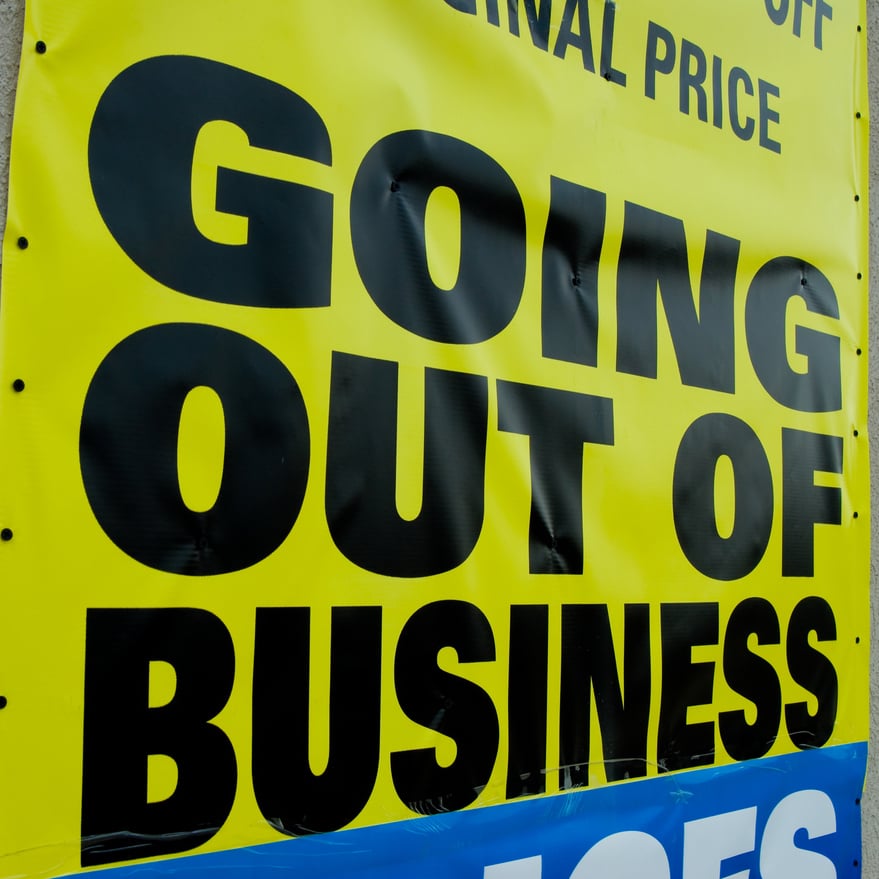
Published:
Last Updated:

In April, Subway, the fast food company with the most locations in the world, announced it would be shuttering roughly 500 of those stores in the United States. These closings are just the latest in a stream of announcements by major retailers.
In what many have dubbed the “retail apocalypse,” brick-and-mortar retailers across the United States have been forced to reduce their footprint in order to maintain profitability in recent years. In the most extreme cases, several well-known brands have had no choice but go out of business entirely. Since the beginning of 2017, major companies, including RadioShack, Payless ShoeSource, Toys “R” Us, and Bon-Ton, have filed for bankruptcy protection.
So far, trouble for traditional brick-and-mortar retailers shows no sign of abating. This year, over a dozen well-known companies are shuttering locations nationwide.
In a handful of cases, store closings are the result of corporate mergers and acquisitions. In some cases, companies appear to be merely culling their most unprofitable stores while adding new stores elsewhere. This is the case with Subway, which opening over 1,000 new locations. However, many retailers on this list are closing locations as a result of falling revenue largely brought on by the convenience and increasing popularity of online shopping.
24/7 Wall St. reviewed publicly available financial documents and corporate announcements to identify the retailers closing the most stores in 2018. Retailers closing the fewest locations — less than a few dozen — tend to be those companies attempting to improve profitability. Companies shuttering several hundred locations, on the other hand, are either being bought out or are declaring bankruptcy and liquidating assets.
Click here to see the retailers closing the most stores.
Click here to see our detailed findings and methodology.

21. J. C. Penney
> Closings: 7
> Total stores: 872
> Industry: Department stores
Few brick-and-mortar retailers are being hit as hard by the surge of e-commerce as department stores. This year, J. C. Penney is expecting to close seven of its store locations and one distribution center in Milwaukee. These seven location closings pale in comparison to last year, when the retailer shuttered 141 locations.
[in-text-ad]
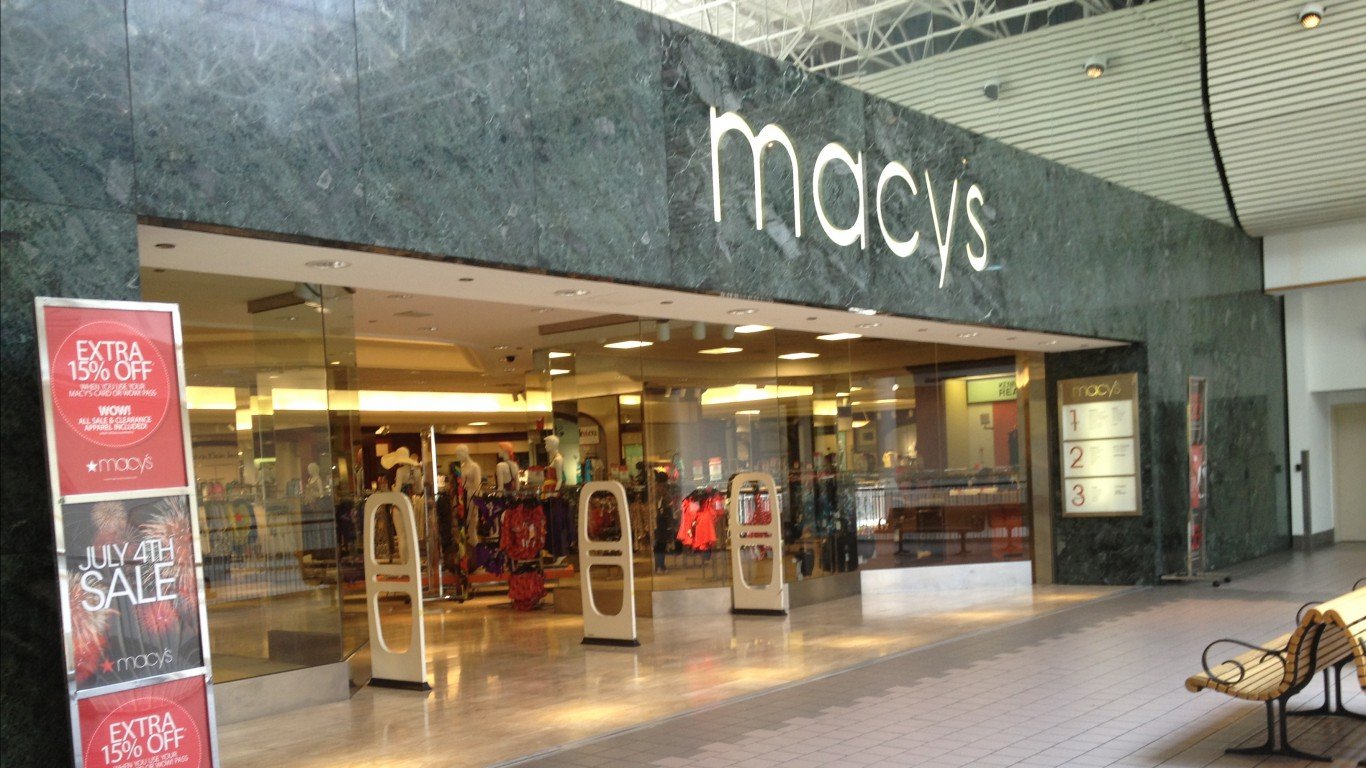
20. Macy’s
> Closings: 11
> Total stores: 852
> Industry: Department stores
Macy’s Inc. is the company behind a the iconic department store chain of the same name as well as Bluemercury beauty specialty stores. In August 2016, the company announced plans to shutter 100 underperforming locations in the coming years amid falling sales. While the retailer already closed the majority of those stores, the company anticipates 11 will close this year.
Hurt by e-commerce, Macy’s reported $24.8 billion in revenue in fiscal 2018, nearly $1 billion less than the previous year’s figure and over $2 billion less than fiscal 2016’s revenue total.
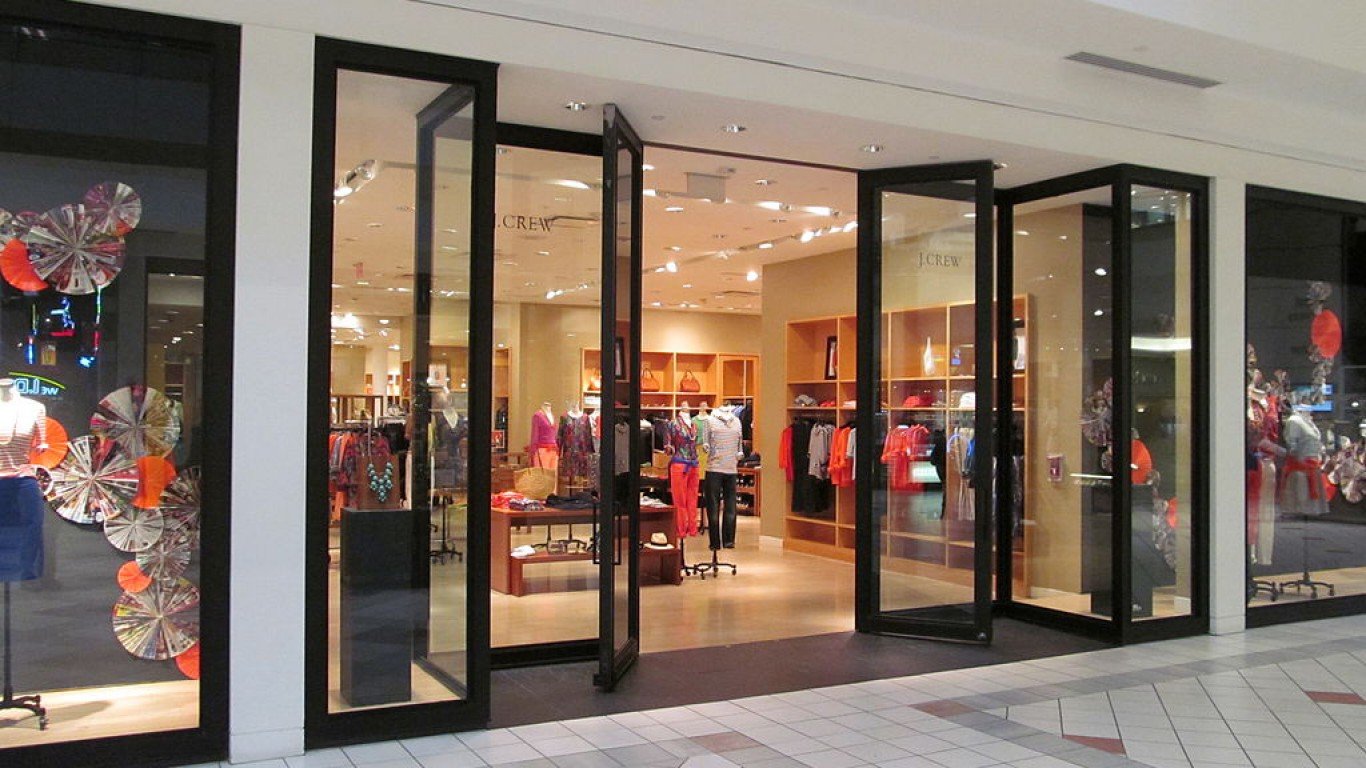
19. J. Crew
> Closings: 20
> Total stores: 532 (United States)
> Industry: Apparel
American retailer J. Crew announced in March it had closed 51 stores during its fiscal 2017 year, 40 of which in the final quarter of the year. In the same release, the company also announced plans to shutter an additional 20 stores during the 2018 fiscal year. The closures would bring the total number of J. Crew locations to 523, down from 571 as of the end of the first quarter of 2017.
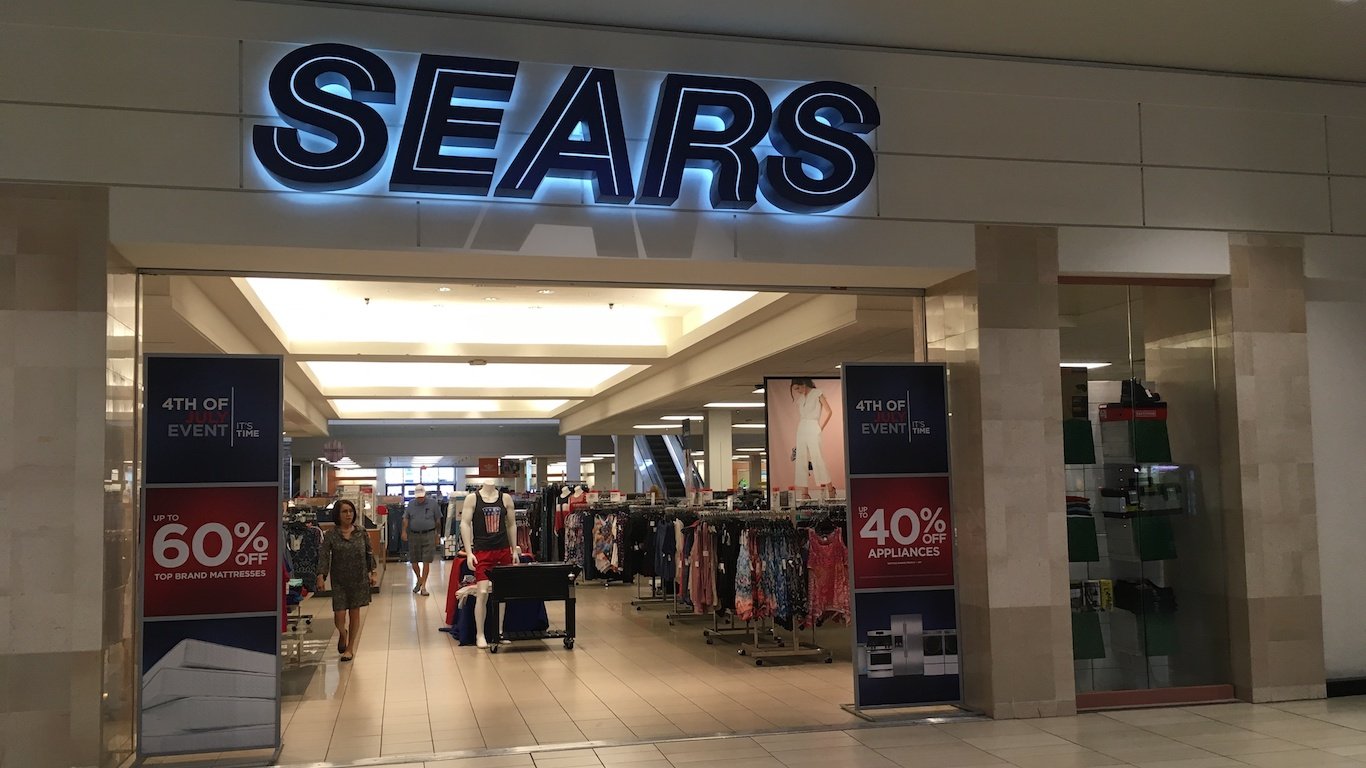
18. Sears
> Closings: 39
> Total stores: 570 (United States)
> Industry: Department stores
Sears Holdings Corp. is the parent company of two troubled department store brands: Sears and Kmart. There were 570 Sears locations nationwide at the end of 2017, though that number will soon drop. The company announced in early January plans to close some 39 Sears department stores in the first half of 2018. The company did not say how many employees the closings would affect.
In the last three years, Sears Holdings revenue fell by about a third, from $25.1 billion in 2016 to $16.7 billion in 2018.
[in-text-ad-2]
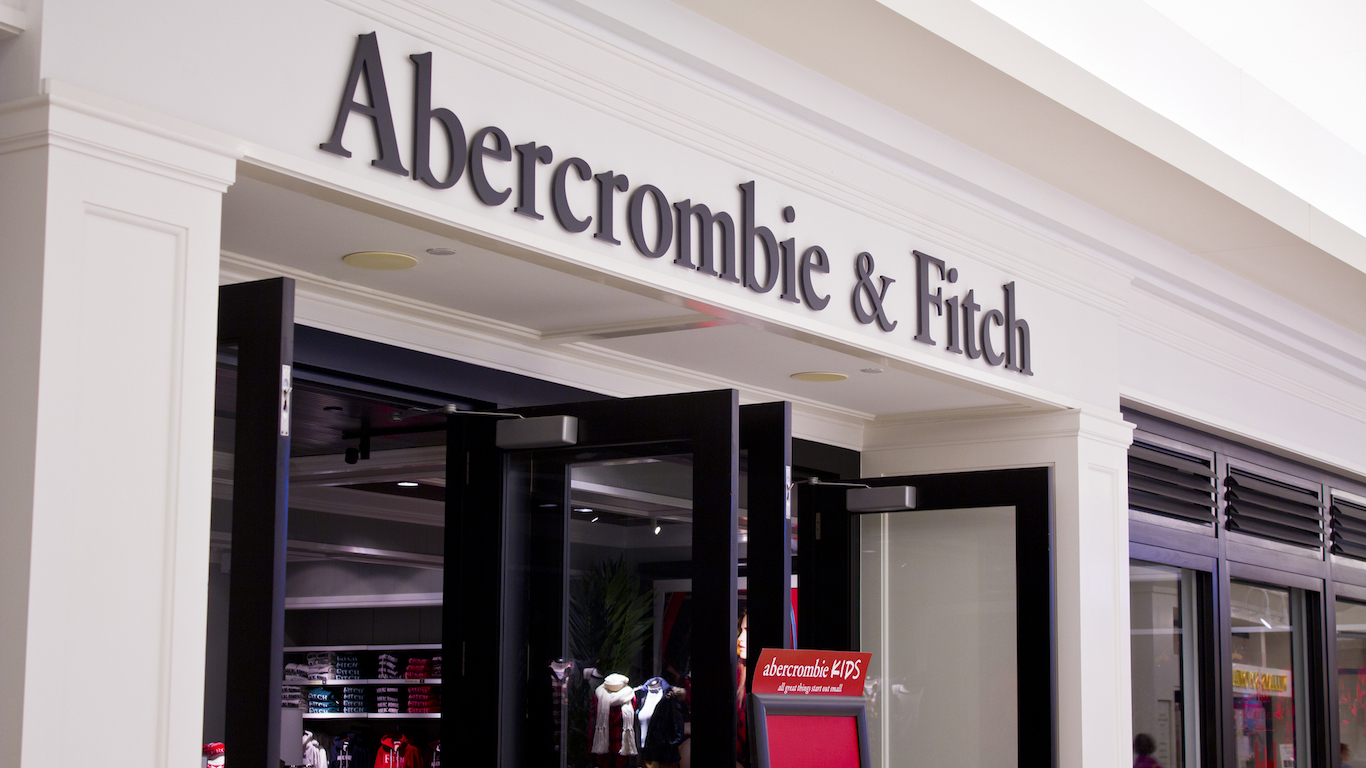
17. Abercrombie & Fitch
> Closings: 60
> Total stores: 679 (United States)
> Industry: Apparel
Abercrombie & Fitch Co. is the parent company of both the Abercrombie and Hollister clothing brands. The company announced at the end of its fiscal 2017 it would be closing a total of 60 U.S. locations in fiscal 2018 as these locations’ leases expire. The closings come despite a 4% increase in the company’s domestic sales in fiscal 2017 compared to the previous year.
The store closures will be partially offset by 11 new U.S. locations as well as 10 new locations abroad the company plans to open in 2018.
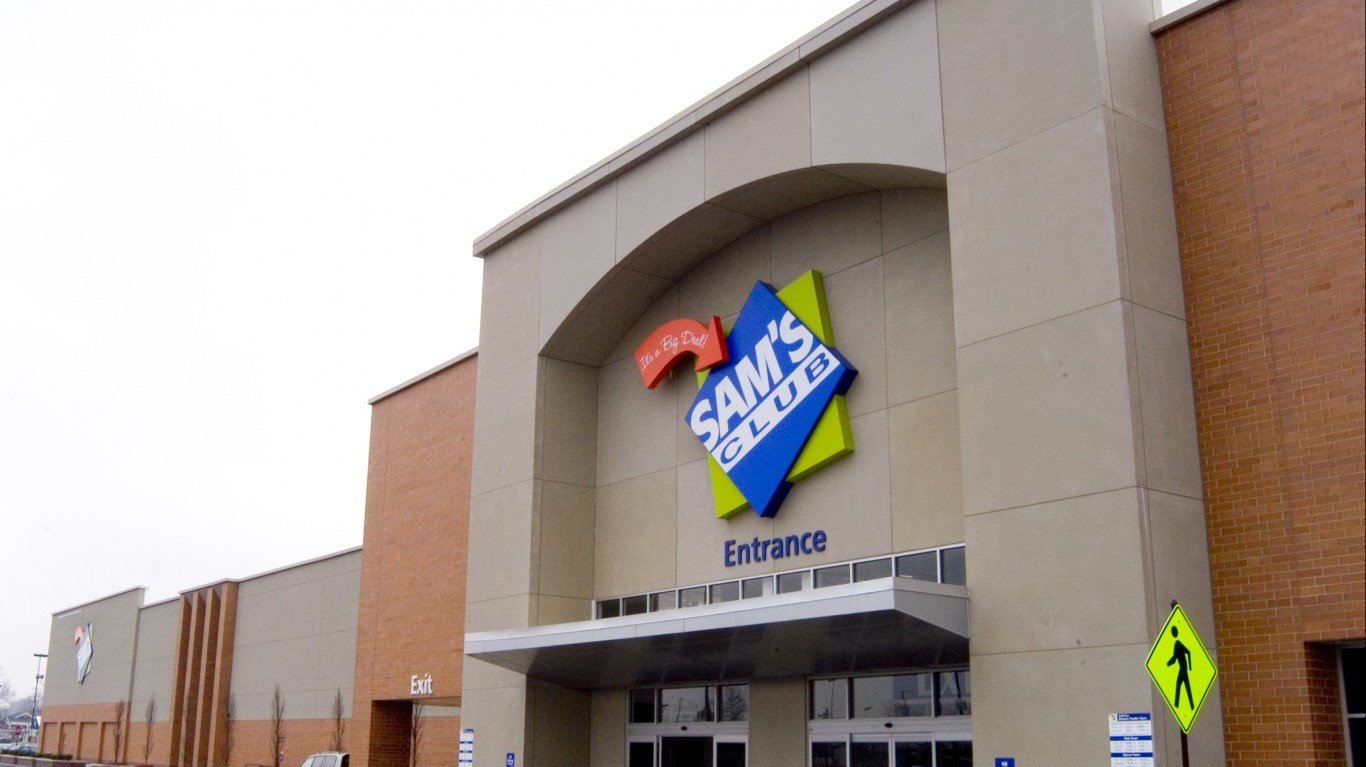
16. Sam’s Club
> Closings: 63
> Total stores: 597
> Industry: Membership retailer
Walmart-owned warehouse club, Sam’s Club, in January announced plans to close 63 locations across the United States, an act that will lead to an estimated 11,000 workers to lose their jobs. The planned store closures amount to roughly 10% of all Sam’s Club locations nationwide. The company’s announcement came as it released plans to raise the starting hourly wage for its employees.
[in-text-ad]
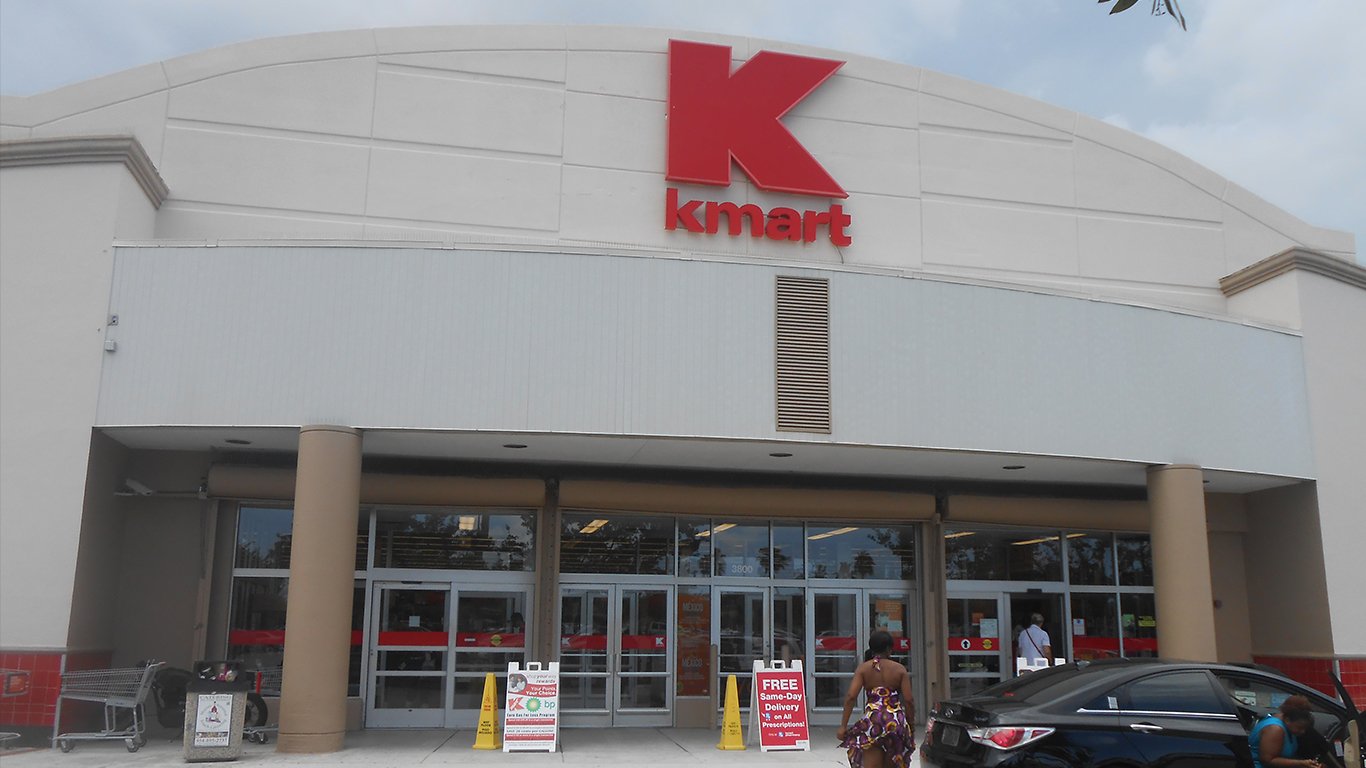
15. Kmart
> Closings: 64
> Total stores: 432 (United States)
> Industry: Department stores
Sears Holdings Corp. is the parent company of two troubled department store brands: Sears and Kmart. In the last three years, Sears Holdings revenue fell by nearly 44%, from $25.1 billion in 2016 to $16.7 billion in 2018.
The company announced in early January plans to close some 64 Kmart stores in the first half of 2018. The company did not say how many employees the closings would affect. As of February 2018, there were 432 Kmart locations nationwide.
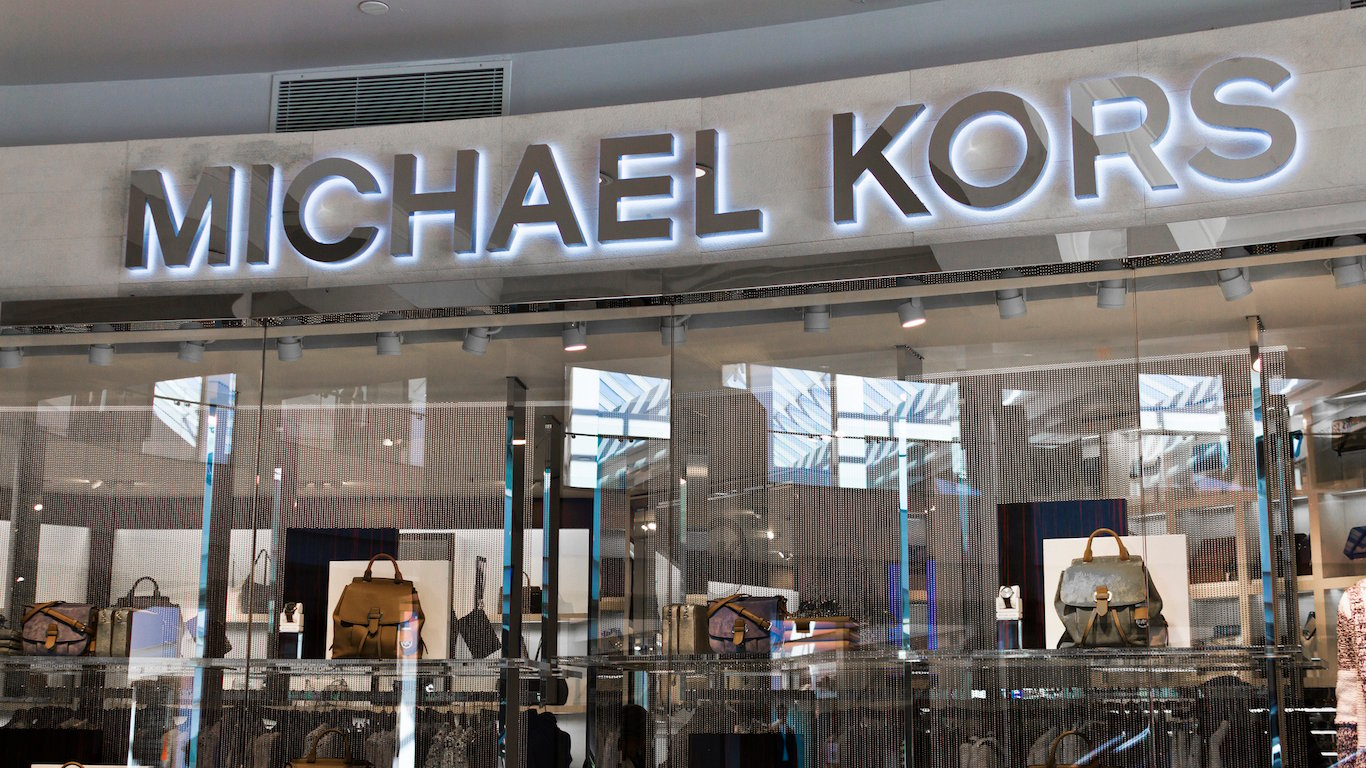
14. Michael Kors
> Closings: 100-125
> Total stores: 429
> Industry: Luxury fashion
Luxury fashion brand Michael Kors is shrinking its retail footprint. In an effort to improve profitability, Michael Kors announced at the end of its fiscal 2017 that it would shutter between 100 and 125 stores over the next two years. While the closings will cost anywhere from $100 million to $125 million in one time costs, the company anticipates $60 million in annual savings as a result.
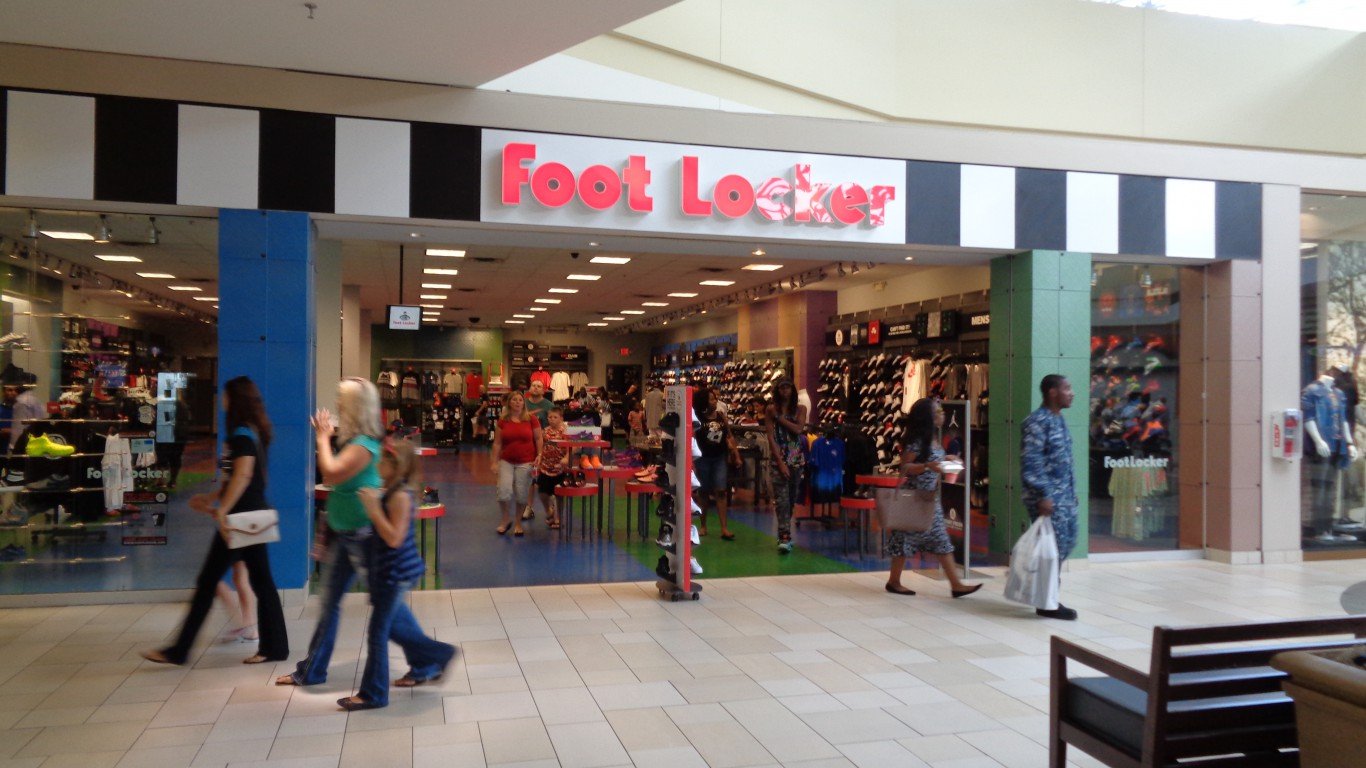
13. Foot Locker
> Closings: 110
> Total stores: 1,835
> Industry: Footwear and apparel
Sportswear and footwear chain Foot Locker is one of several staples in malls across America planning to shutter multiple locations in 2018. In the company’s fourth quarter fiscal 2017 earnings call, the company’s CFO announced the expected closing of 110 stores in 2018. Further underscoring what appear to be troubled times for the company is the relatively few new store openings. Only about 40 new Foot Locker locations will open in 2018, down from the typical count of nearly 100 store openings per year.
[in-text-ad-2]
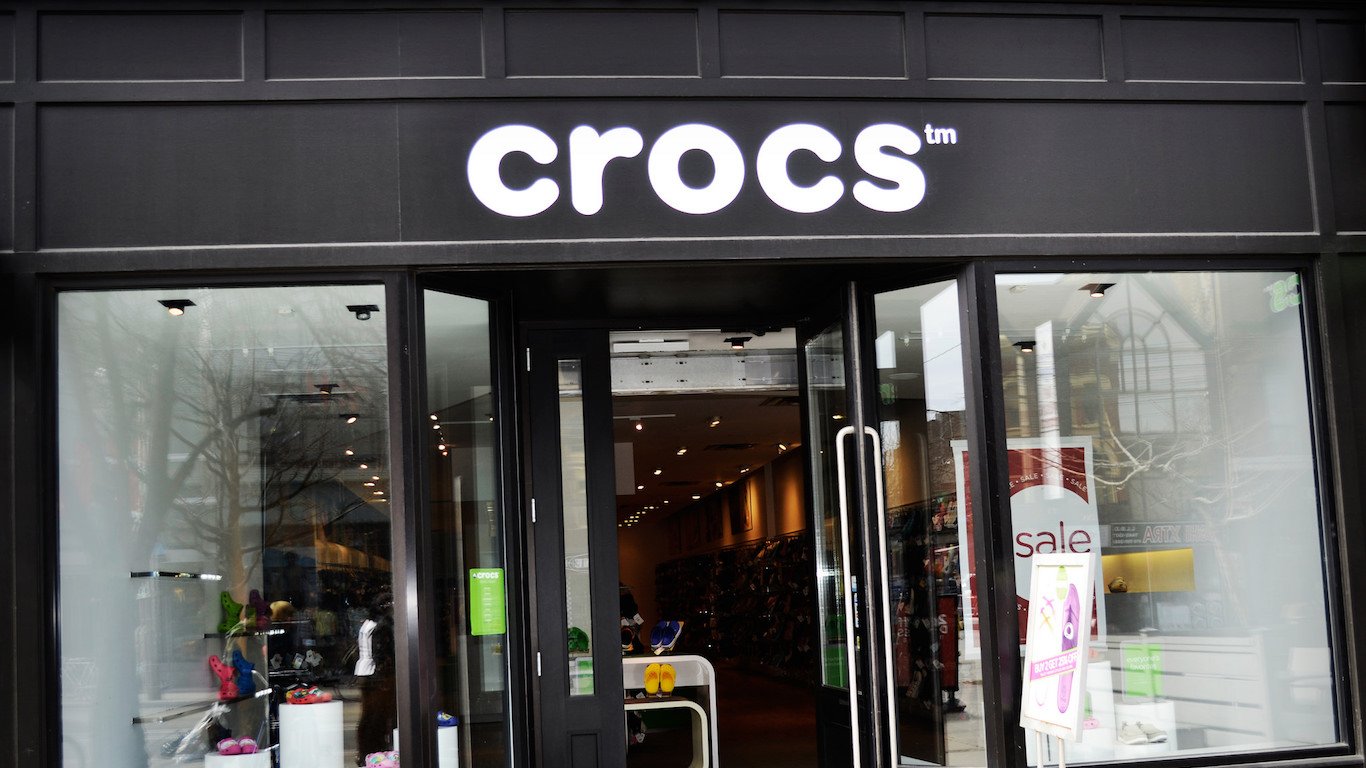
12. Crocs
> Closings: ≈160
> Total stores: 447
> Industry: Footwear
Casual footwear company Crocs is reducing its footprint. The company reportedly intends to reduce its store count by a net of 160 locations by the end of 2018. The move is a part of the company’s broader strategy for sustainable profit growth, which, in addition to closing underperforming stores, also includes increased emphasis on digital commerce.
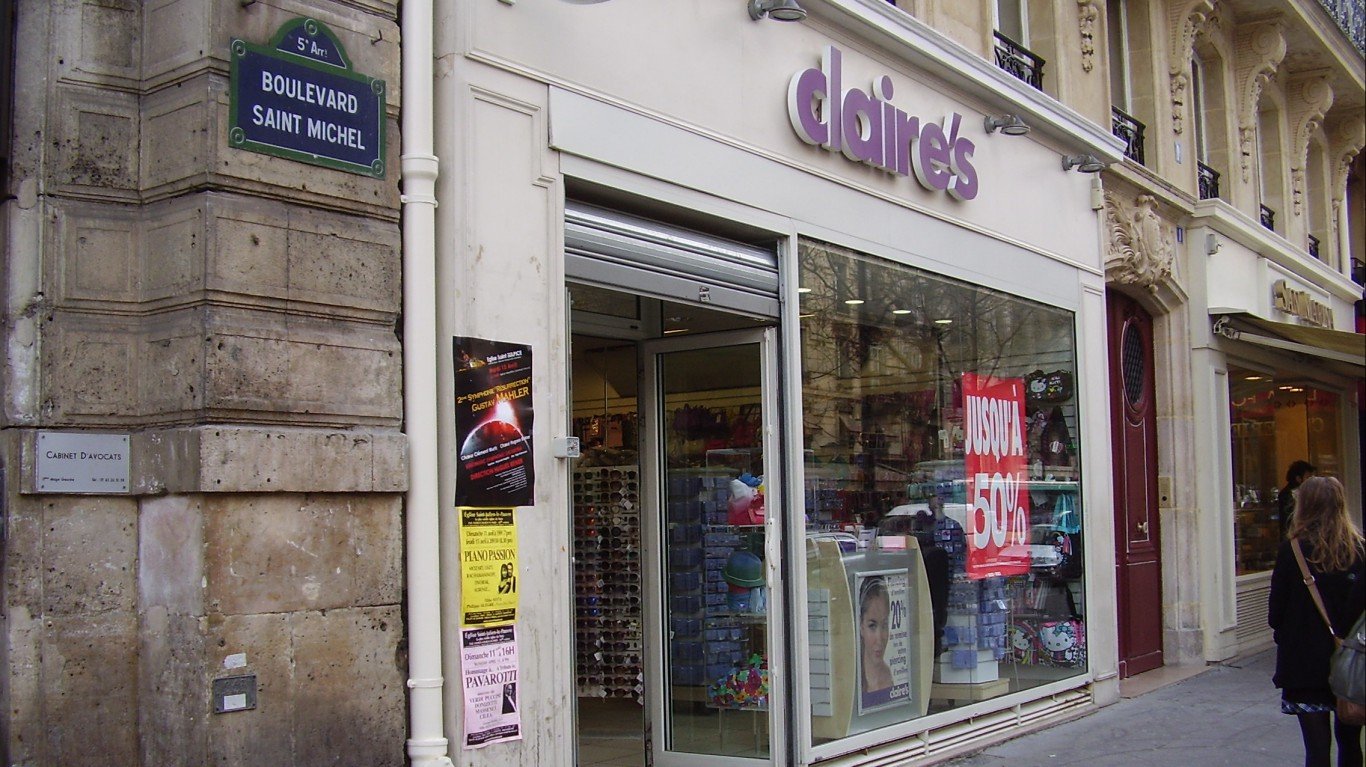
11. Claire’s
> Closings: 170
> Total stores: 1,570 (North America)
> Industry: Jewelry and accessories
Young adult jewelry and accessories brand Claire’s filed for bankruptcy this March in an attempt to relieve its nearly $2 billion in debt. The company, which is primarily based in malls and shopping centers, has struggled, and the company plans to close some 170 of its 1,570 locations by 2022.
[in-text-ad]
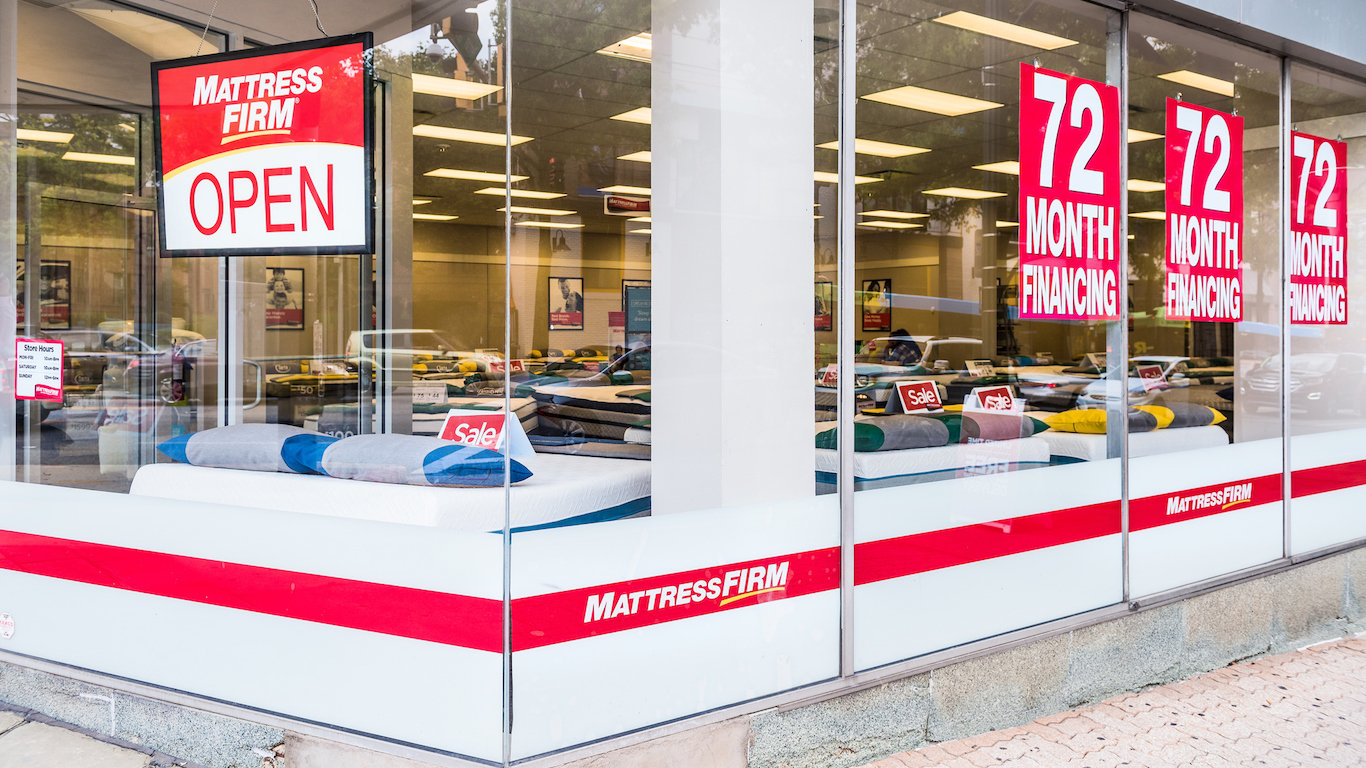
10. Mattress Firm
> Closings: 175
> Total stores: 3,423
> Industry: Household goods retail
Steinhoff International Holdings, parent company of bedding retailer Mattress Firm announced at the end of 2017 the imminent closing of some 175 Mattress Firm locations in the United States. The 2018 closures will be offset slightly by the opening of some 75 new locations. The planned closures are the continuation of the company’s plan to adjust to shifting market conditions. The company closed 99 Mattress Firm locations and opened eight in the final three months of 2017.
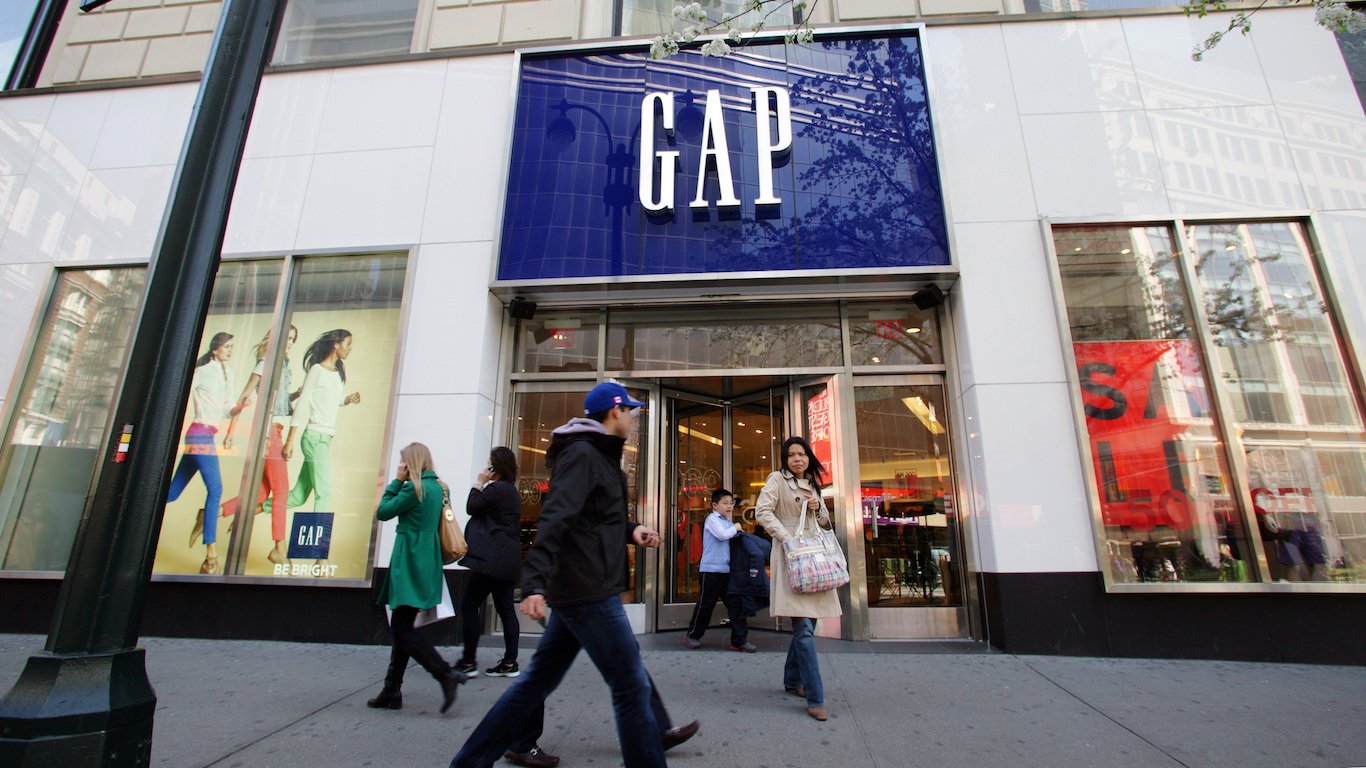
9. Gap Inc.
> Closings: 200
> Total stores: 2,600 (North America)
> Industry: Clothing
Gap Inc., which owns several well-known brands, including Gap, Old Navy, and Banana Republic, announced in September 2017 that it would be closing about 200 Banana Republic and Gap locations over three years. While those two brands will shed some stores, the company also said it will add 270 Old Navy and Athleta locations.
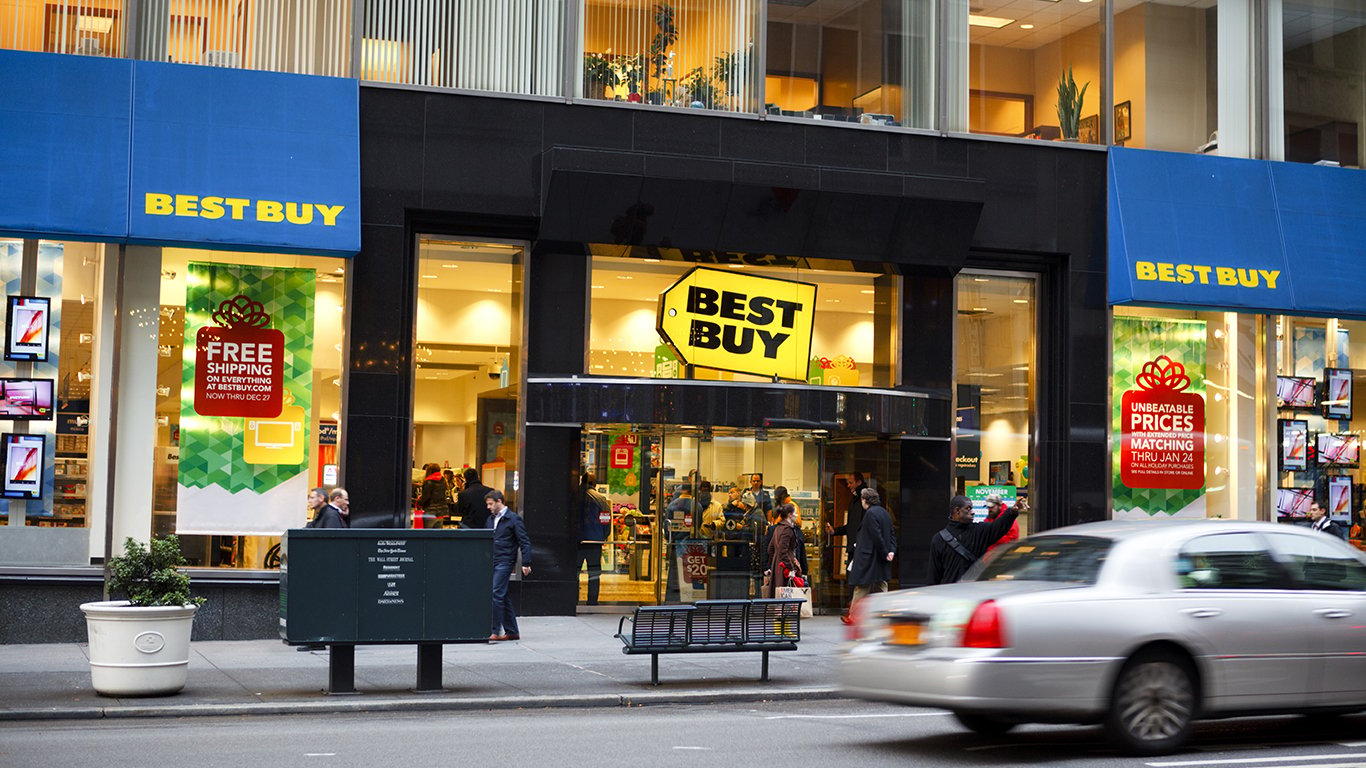
8. Best Buy
> Closings: 257
> Total stores: 1,008 (United States)
> Industry: Electronics
Electronics retailer Best Buy announced in March it would close all 257 of its small-format mobile stores. These stores, which primarily sell phones, and were built to account for skyrocketing demand for the devices following the advent of the smartphone, had become unprofitable, according to the company.
While many big box retailers are reporting revenue declines, Best Buy is bucking the trend. Partially because of its price match guarantee, which states the company will match lower prices offered at online retailers like Amazon, Best Buy’s revenue climbed from $39.4 billion in fiscal 2017 to $42.2 billion in fiscal 2018.
[in-text-ad-2]
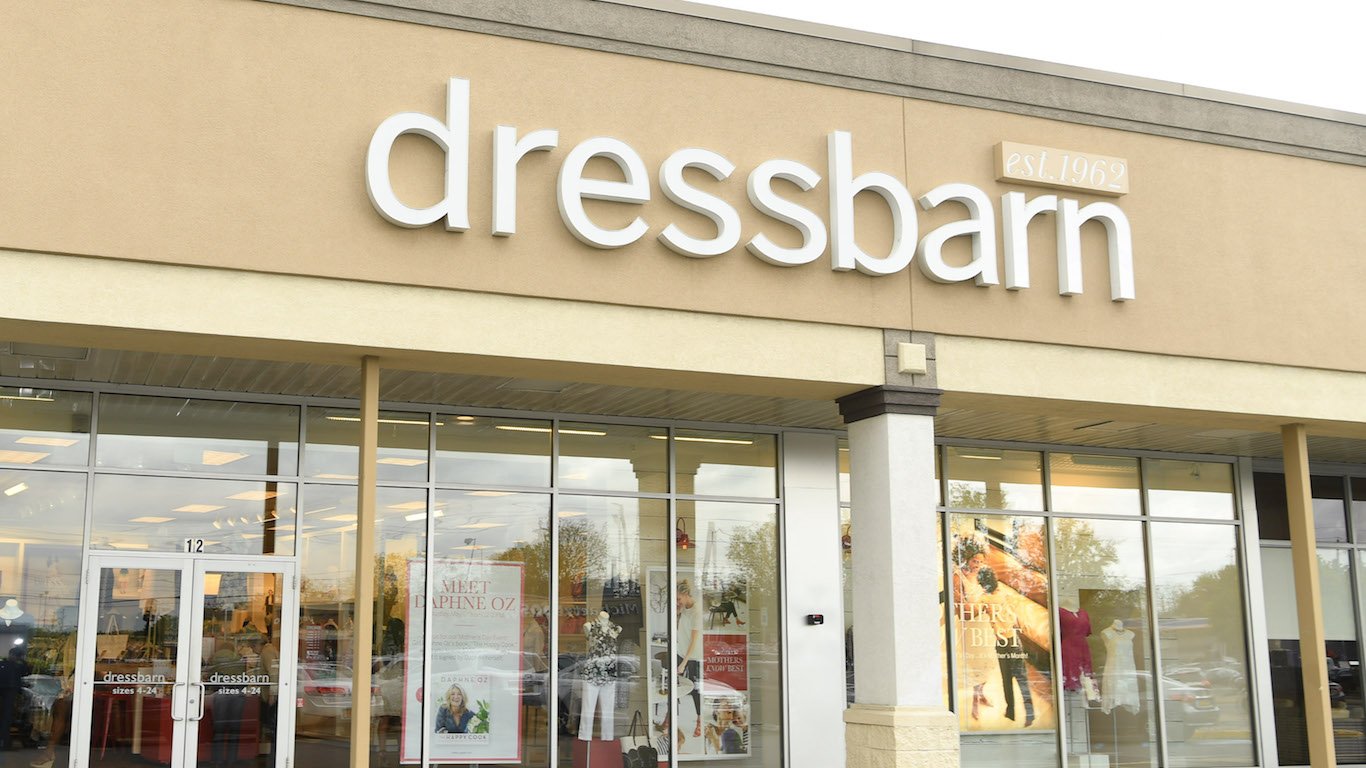
7. Ascena Retail Group
> Closings: 250-650
> Total stores: 4,807
> Industry: Clothing and home goods retail
Ascena Retail Group is the parent company of a number well known retail brands, including Ann Taylor, Dressbarn, Lane Bryant, and Justice. In a quarterly earnings call in 2017, the company announced plans to shutter 250 locations, and potentially an additional 400 locations in the case that lower lease costs cannot be negotiated. Some 1,031 leases of the company’s retail stores are expiring in 2018. This year’s closings come on the heels of 120 store closures in fiscal 2017.
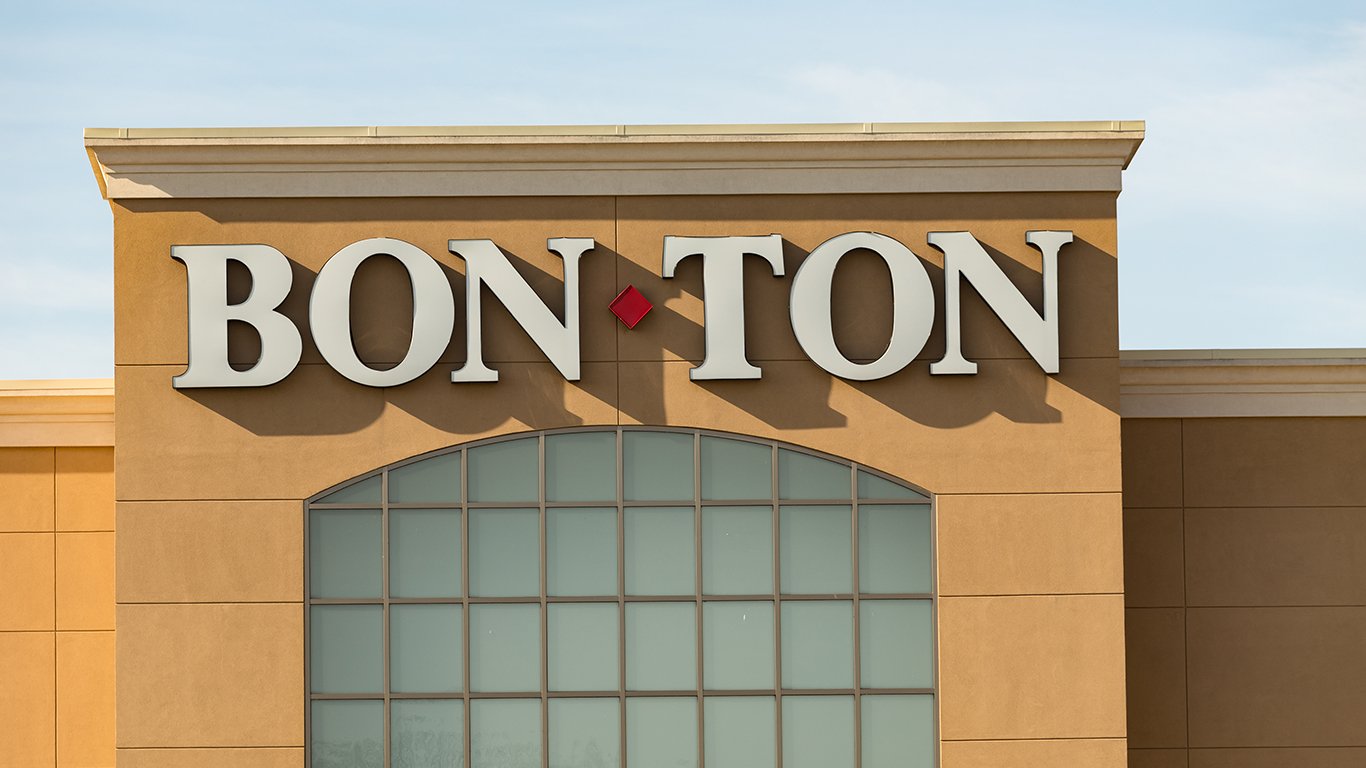
6. Bon-Ton Stores Inc.
> Closings: 256
> Total stores: 256
> Industry: Department store
The Bon-Ton Stores Inc. is the parent company of a number of chains, including the department store chain of the same name as well as Boston Store, Younkers, and Carson’s. After over 150 years in operation, the Bon-Ton chain and and the company’s other nameplates are going out of business completely in 2018 — shuttering all 256 locations. The company’s liquidation process began on April 20th and is expected to continue for approximately three months.
[in-text-ad]
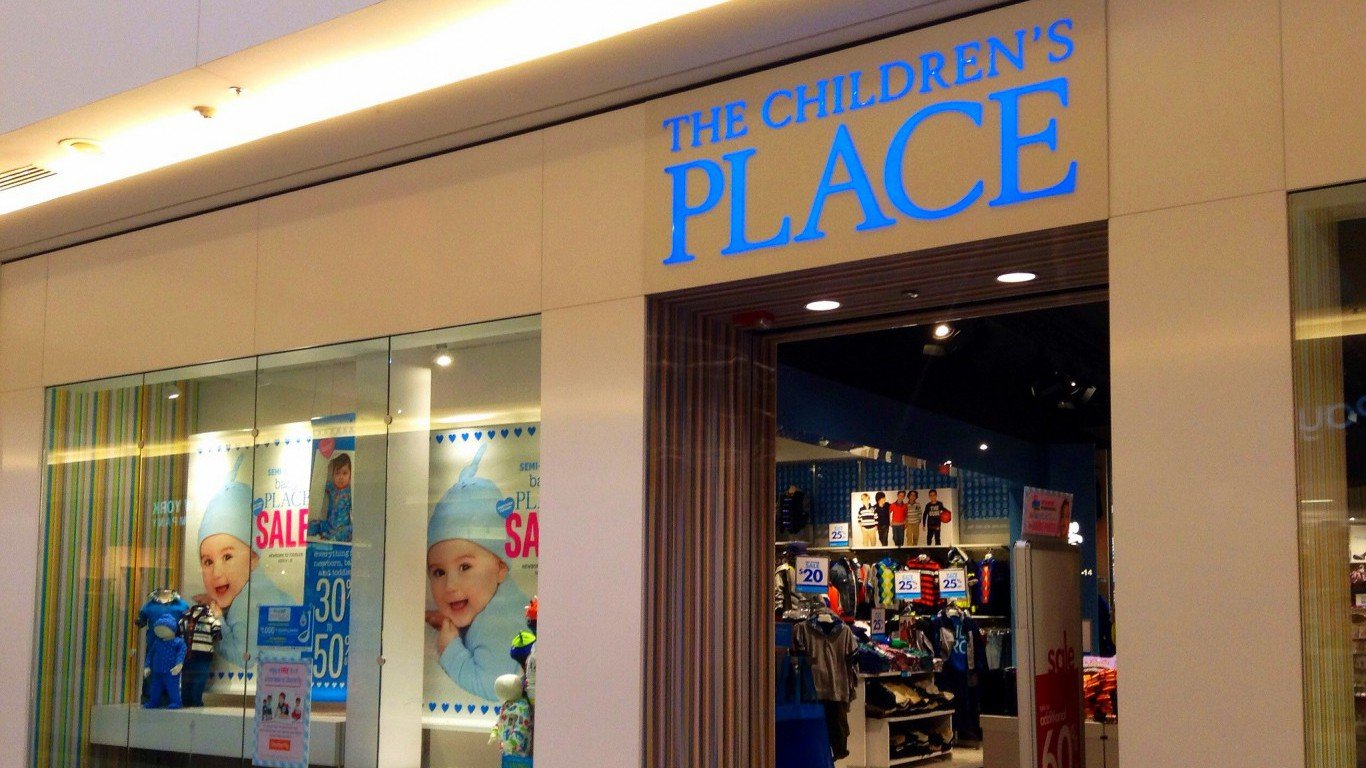
5. The Children’s Place
> Closings: 300
> Total stores: 1,014
> Industry: Children’s apparel
Children’s clothing and accessories store The Children’s Place announced it would be closing 300 locations by 2020. In fiscal 2017, the company reported net income of $85 million, down from a five-year high of $102 million the previous year.
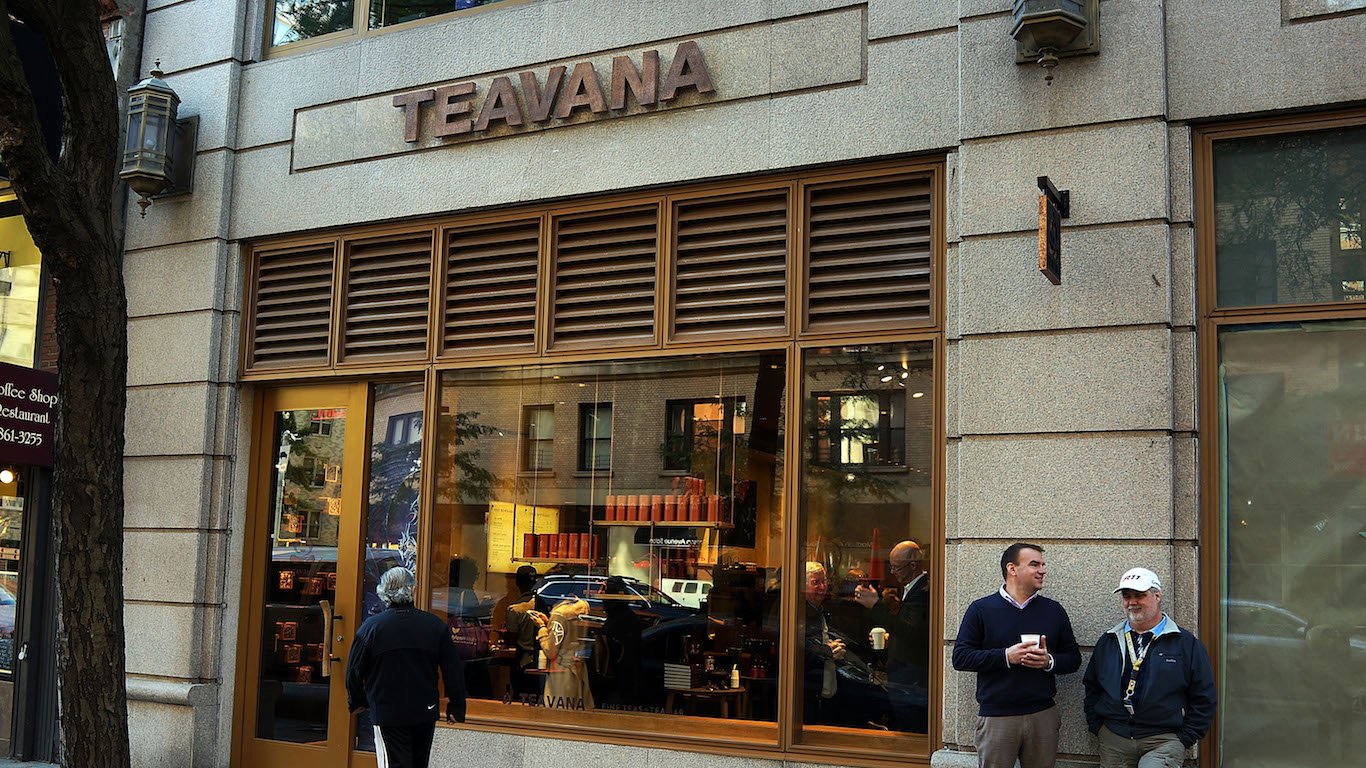
4. Teavana
> Closings: 379
> Total stores: 379
> Industry: Specialty food
Starbucks acquired specialty tea retailer Teavana in November 2012. Less than five years later, the coffee shop chain announced plans to shutter all 379 Teavana locations by the summer of 2018. However, Starbucks’ plan hit headwind when Simon Property Group, owner of the retail space of some 77 shopping mall Teavana locations, sued to keep the stores open. In early 2018, Starbucks reached a deal with Simon, and is no longer prevented from carrying out its planned closings.
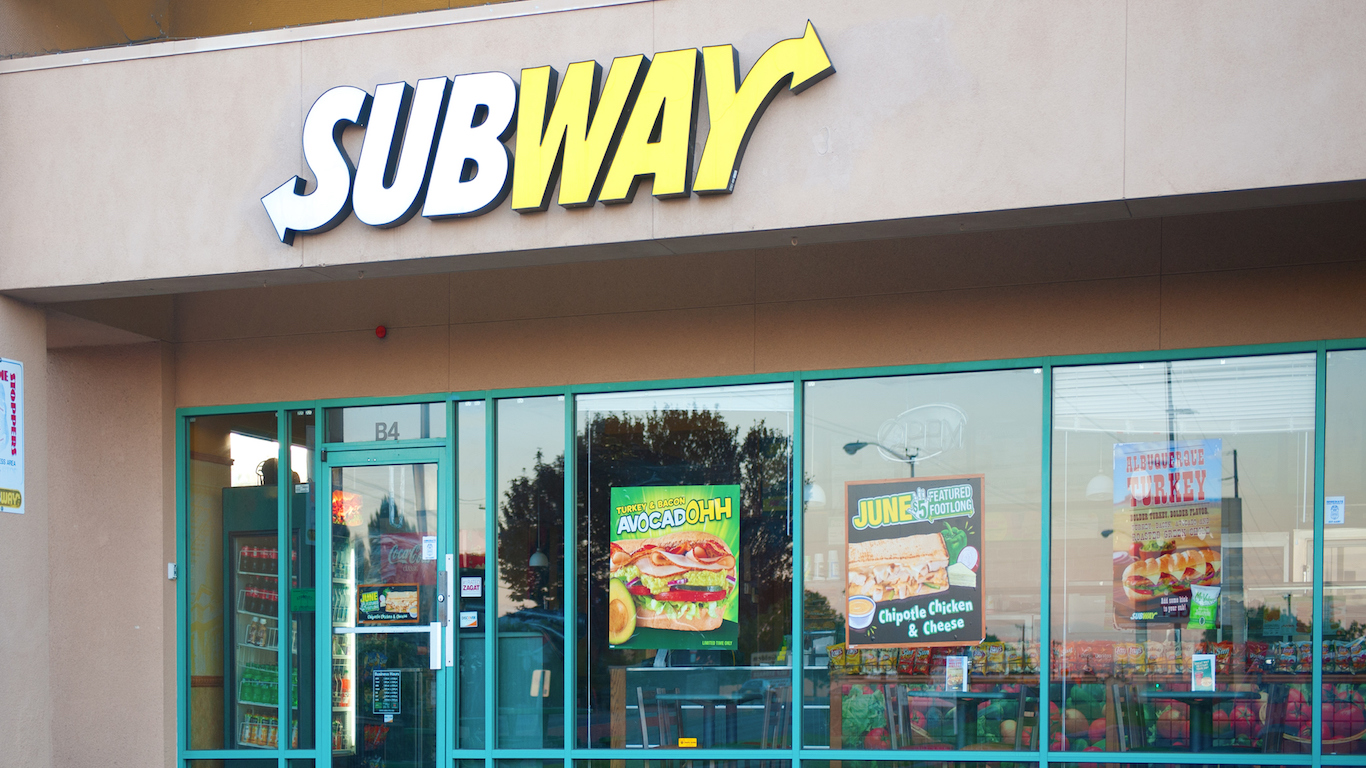
3. Subway
> Closings: 500
> Total stores: 25,452 (United States)
> Industry: Fast food
No fast food restaurant has more locations worldwide than Subway, at 44,000. It also is the most widespread in the U.S., with more than 25,000 locations, which is roughly 10,000 more than its closest competitor, Yum! Brands. That lead in North America is about to shrink, however, as the sandwich shop company announced in April that it would shutter 500 locations in the U.S. It will, however, add to its international lead, as it plans to open roughly 1,000 locations overseas.
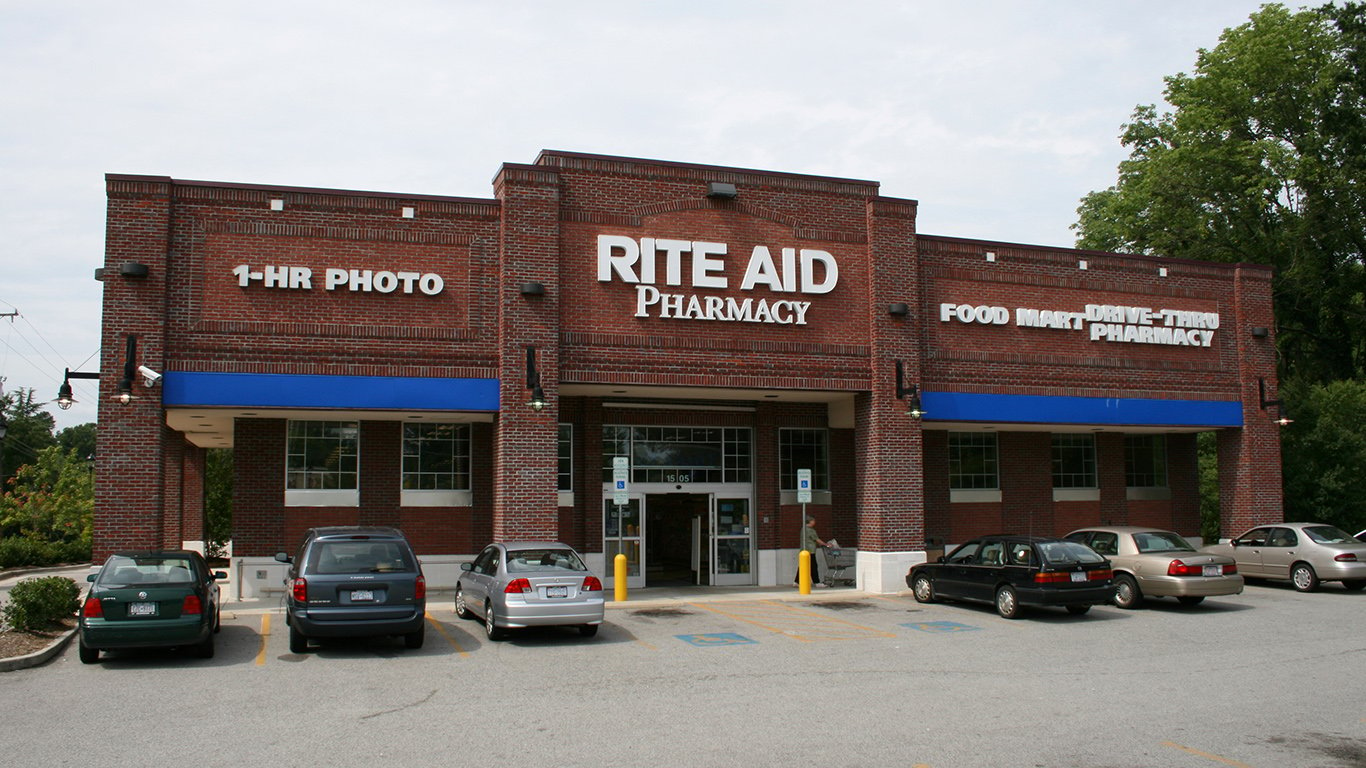
2. Rite Aid
> Closings: 600
> Total stores: 4,536
> Industry: Pharmacies
For years now, Walgreens has been in the process of purchasing a massive share of its rival Rite Aid’s locations. When Walgreen completes the deal to buy the locations, it will close 600 of the over 1,932 locations it will have purchased. Rite Aid will be paid $4.4 billion for its stores.
[in-text-ad-2]
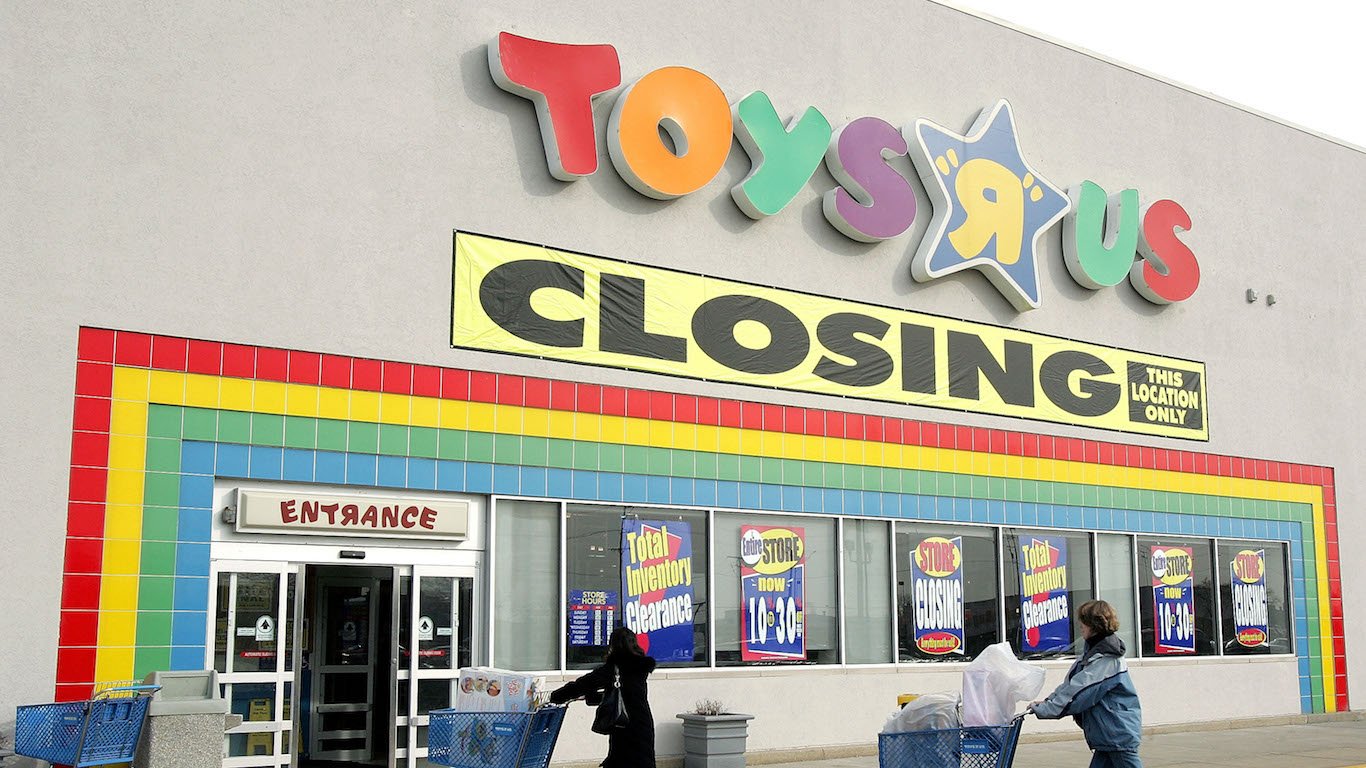
1. Toys “R” Us
> Closings: 735
> Total stores: 735 (United States)
> Industry: Toys
The parent company of famed children’s toy company Toys “R” Us has been in dire financial straits for some time. The company entered bankruptcy in September 2017 with the hopes of restructuring and finding a buyer for its operations, but there have been no takers. Now, the company will liquidate all 735 of its existing properties in the United States.
Detailed Findings & Methodology
An estimated 76% of Americans regularly use the internet, up from just 43% in 2000. This ever increasing access to instant information and services has had far reaching and profound effects on society and the economy — perhaps most notably in the retail sector.
In the last three years, revenue of e-commerce giant Amazon climbed 66%, from $107.0 billion in 2015 to $177.9 billion in 2017. Meanwhile, revenue of once seemingly unassailable brick-and-mortar department stores like J.C. Penney, Macy’s, and Sears Holdings, are all down over the same period.
Although many shoppers still frequent these stores, many increasingly use them to find the products they want only to buy them online. This practice is known as showrooming.
In an attempt to adjust to changing consumer preferences, many companies on this list are focusing more heavily on e-commerce. Businesses as diverse as department stores and more focused retailers such as casual footwear manufacturer Crocs are all putting greater emphasis on online sales. Other companies, like Best Buy, have adjusted to the growing threat of e-commerce by offering to match Amazon’s prices in store.
For others, any attempt at change has been too little, too late. Two companies on this list — Bon-Ton and Toys “R” Us — filed for bankruptcy and will be liquidating their assets this year.
To identify the companies closing the most stores, 24/7 Wall St. reviewed major U.S. retailers that have announced store closings for 2018. All listed store closings are based on company announcements of closures that will either take place at least partially in 2018. Store counts represent the total number of stores worldwide, unless a specific geography is noted, and are from the company annual reports and corporate websites. Store counts represent the most recent available number and do not necessarily factor in closings.
Are you ready for retirement? Planning for retirement can be overwhelming, that’s why it could be a good idea to speak to a fiduciary financial advisor about your goals today.
Start by taking this retirement quiz right here from SmartAsset that will match you with up to 3 financial advisors that serve your area and beyond in 5 minutes. Smart Asset is now matching over 50,000 people a month.
Click here now to get started.
Thank you for reading! Have some feedback for us?
Contact the 24/7 Wall St. editorial team.